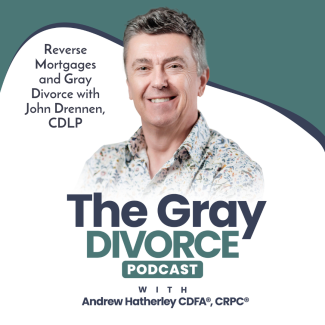
The Gray Divorce Podcast: Episode 33 Reverse Mortgages and Gray Divorce with John Drennen, CDLP
In episode 33 of The Gray Divorce Podcast, Andrew chats with Certified Divorce Lending Professional John Drennen on the topic of reverse mortgages. What is a reverse mortgage and how might it be a solution for gray divorcees?
What is a Reverse Mortgage?
There are many types of reverse mortgages, but the most common is the FHA insured home equity conversion mortgage or HECM. It is the only reverse mortgage insured by the federal government, and typically, because of the government’s involvement, has more generous financing terms.
A HECM allows homeowners aged 62 or older to access a portion of their home equity in cash, monthly payments, or a growing line of credit. The homeowner keeps ownership of the home, but must occupy it, maintain it, and pay all property charges.
The homeowner does not have a monthly payment. The word “reverse” is used because the loan balance increases overtime, compared to a traditional mortgage and is typically paid off when the house is sold.
Some common misconceptions about reverse mortgages
-
The bank or lender will own the home. In fact, homeowners retain title and can choose to sell their home when they want. The homeowner is responsible to maintain the home as their principal residence and pay property taxes.
-
The homeowner will owe more than the value of the home. John discusses the “non-recourse” feature of reverse mortgages. This states that the homeowner is not responsible for mortgage debt beyond the home’s value. The “FHA guarantees that neither the borrower nor their heirs will owe more than the home is worth at the time it is sold.”
How can reverse mortgages help older divorcees
-
In one solution, a HECM on the marital home can provide funds for the departing spouse’s down payment on a new home. The departing spouse can then use a home purchase HECM to pay the rest of the purchase price. There are no debt service obligations for either spouse. And no sale of the marital home. There is also a good chance that both spouses retain homes of comparable value.
-
Another solution would see the sale of the marital home and the proceeds divided. Each spouse would then use their share to cover the down payment on a new home and then they could use a home purchase HECM to pay the rest. Once again there is no debt service obligation for either spouse.

